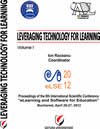EDUCATING NET GENERATION STUDENTS: IS “GUTENBERG TEACHING APPROACH” ENOUGH?
EDUCATING NET GENERATION STUDENTS: IS “GUTENBERG TEACHING APPROACH” ENOUGH?
Author(s): Anca NedelcuSubject(s): Education
Published by: Carol I National Defence University Publishing House
Keywords: Net generation; teaching methods; learning environment
Summary/Abstract: A significant part of building a valid learning process, in any kind of environment, is to know and understand the learners. Starting from their needs and abilities, from their aspirations and interests, a successful learning process can be built for the mutual benefit of all school actors and wider community. Consequently, an important pre-action for any educational reforming process is to visualize and understand the real profile of nowadays students as a basis for generating improved actions. Therefore, how are these students? Are they different from other cohorts, are they unlike any others teachers have ever interacted with? If “yes”, if their new lifestyle, abilities, learning and communication styles represent a powerful demarcation from the predecessors, is school prepared enough to manage these changes? Do teachers find the right approaches to facilitate students’ learning? Is the book the only source of knowledge reliable in school context? Is, for example, book and textbook based “Gutenberg teaching style” powerful enough to address the diversified learning needs of Net generation students? These are, in fact, the basic questions addressed by the present paper; the intention is to identify the challenges addressed by what Marc Prensky calls "digital natives" students on teaching provided by adult educators, usually “digital immigrants”. The approach aims to analyze the “meeting” between the two generations placed alongside the intergenerational digital divide (Prensky, 2001), students and teachers, with the goal of mediating the possible gap. For illustrating the approach, examples from different researches on nowadays students and teachers’ didactical approaches will be taken into consideration.
Journal: Conference proceedings of »eLearning and Software for Education« (eLSE)
- Issue Year: 8/2012
- Issue No: 01
- Page Range: 270-275
- Page Count: 6
- Language: English

